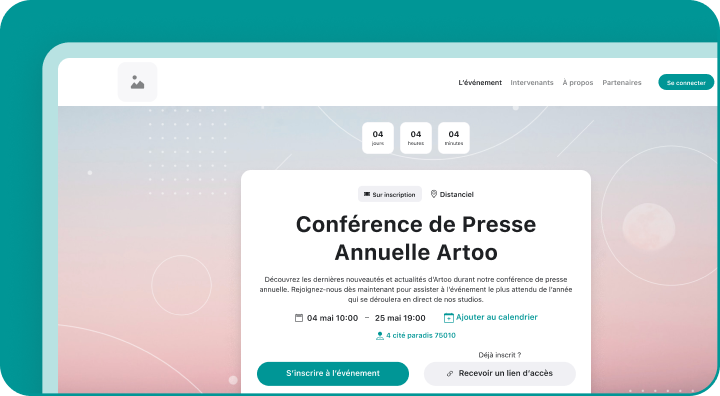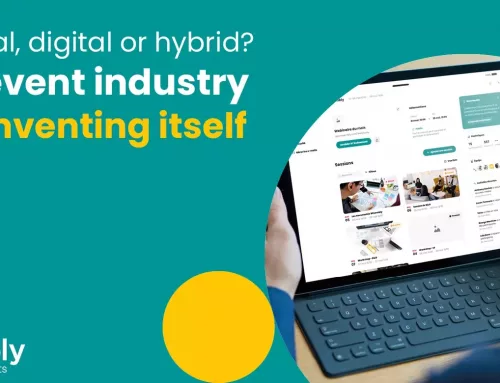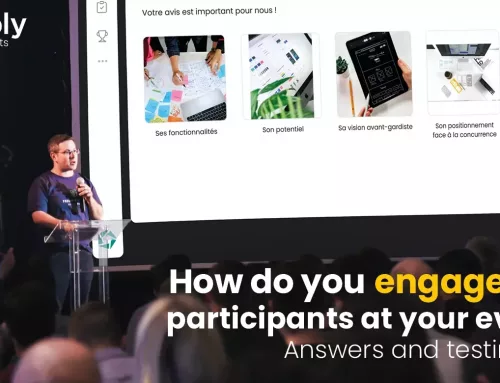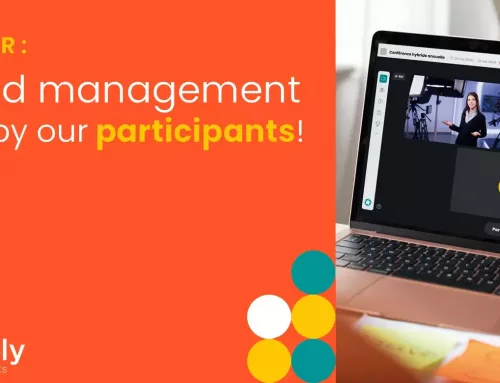Webinar: hybrid management seen by speakers!
Last week, we offered you to relive our webinar… From the participants’ point of view (if you missed it, there is still time to catch up! It’s happening here). Hosted on our Wisembly platform, we were able to set up interactive modules, which were broadcast throughout the event… This allowed us to survey the participants, and to draw major trends from the topics discussed.
Today, it is our speakers that we have decided to honor!
- Raphaël Boukris is the co-founder and Chief Revenue Officer of Didomi, a B2B SaaS company specialized in the issue of consent. In figures, Didomi is: more than 100 employees, 33 nationalities, remote-first company and more than 45 million dollars raised.
- Jimmy Gelsomino has made his career in Human Resources, including 10 years as HR Director. Specialized in change management and transformation support, he works as a coach and trainer for companies. He is co-founder of the consulting firm ENOOIA, which specializes in supporting companies and communities in all aspects of ecological transition and responsible transformation.
On the agenda for this article: feedback on hybrid management, advice, best practices… Make yourself comfortable, here we go!
1 – What was the impact of the health crisis on management?
The health crisis has accelerated a trend, which was already underway before Covid-19: that of digital management. Telecommuting was imposed, collaborative tools were improvised, work/personal life balance was disrupted… It is a whole organization that was shaken up for a good number of companies.
At Didomi, on the contrary, remote working has been part of the internal culture since the company was founded. Raphaël Boukris told us:
“We have an empowering corporate culture: we write processes on a daily basis, for example, and communicate a lot.”
Yet, almost two years after the first wave, the habits of the French have changed – and their relationship to work has evolved. As Jimmy Gelsomino pointed out:
“We must distinguish between the remote work of 2020, during the health crisis, which was suffered… To the hybrid model that is gradually being put in place, and which is being taken over by companies and managers.”
The health crisis has indeed caused many French people to question themselves. Jimmy Gelsomino confirmed this:
“Before Covid-19 we used to focus on work, friends and family, and then on well-being in last place. Now, friends and family come first, followed by well-being, and then work. Inevitably, this has had an impact on management.” Many French people are actually looking for meaning, much more than a work/personal life balance.
2 – Remote work: benefits and risks
If for some people remote work is synonymous with liberation and autonomy; for others, a regular return to the office is essential to their daily life.
Several factors can indeed be real brakes: lack of space at home, more introverted personalities and increased difficulty to communicate remotely, specificities of the job… Even loneliness and isolation, as Jimmy Gelsomino underlined: “For some people it is difficult to reconcile professional and personal life: because the personal working conditions do not allow it, because there is no more limit with the professional sphere…”. There are many criteria to take into account before implementing a real management in hybrid mode, and the main objective is to meet the needs of each individual.
“There is no universal rule: depending on the maturity of the person, their motivation, the space they have at home, we must calibrate a rhythm that will be dedicated to them. It depends on their profile and their needs.” Raphaël Boukris

The co-founder of Didomi also insisted on the necessity to give the means and the adequate method to carry out remote work, especially to young profiles. Hybrid management must be adapted to the profession.
The advantages of digital technology has also broken down the boundaries:
- Possibility to hire employees remotely, resulting in time savings and real mobility;
- Increase of productivity by 20 to 25%, as Jimmy Gelsomino told us;
- Greater autonomy and accountability of teams, for example.
“At Didomi we are convinced that the more we give confidence to the person, with clear objectives, the more we empower them.” Raphaël Boukris
3 – Unite and motivate: how to maintain real cohesion with remote teams?
When you no longer see each other in the corridors or at the coffee machine, you have to find a new way to communicate and reinvent yourself. Fortunately, we are in 2021 (almost 2022!) and there are many solutions: collaborative platforms such as Wisembly, information systems… Whether it’s to exchange information or to monitor the performance of your teams, with the right tools, the results will be there.
To federate and motivate remote employees, Jimmy Gelsomino reminded us of the importance of properly training managers in these new ways of working: “Managers need to be trained in the new ways of collaboration. Trusting and piloting will replace the “I command and control” approach. The manager will have to organize and regulate interactions.”
If the collaborative platforms are numerous and allow today to dynamize your meetings and events one can not more simply; these appointments in digital only reinforce, enhance the physical moments, and are complementary.
“Have strong moments in person. We must reinvest in team building activities, workshop days. Use, get together, work around the value base. Remote work is not at all a threat to cohesion.” Raphaël Boukris

But maintaining the morale of the teams also requires listening: taking the time to understand the individuality and the functioning of each person, planning more regular one-to-one meetings, and even addressing the morale of the employees. In short: go deep, don’t leave anyone in distress.
4 – How to meet the expectations of your teams, used to teleworking?
If the health crisis “forced” a large part of the organizations to go remote – today, many people are used to this way of working, and wish to continue it on a daily basis.
“The crisis and the implementation of the flex office have highlighted what is expected of the hybrid manager, 2.0. That is, a more relational, situational management, on a case-by-case basis.” Jimmy Gelsomino
Of course, managing remotely does not necessarily allow us to see the weak signals that can be detected in everyday situations experienced in the office; but Raphaël Boukris reminded us that the right rhythm is one in which the company and the teams win in terms of flexibility. This was the case at Didomi: “We were in test and learn, everyone was able to choose their own pace.”
Many best practices on hybrid management emerged from this webinar. Remote work, trust, autonomy, responsibility, performance… Several factors come into play, but one thing is certain: the hybrid format is the management of the future!
With Wisembly, keep a strong link with your employees wherever they are: thanks to our many interactive modules, whether for a meeting or an event, simply unite and motivate your teams. No more reason not to get involved!




